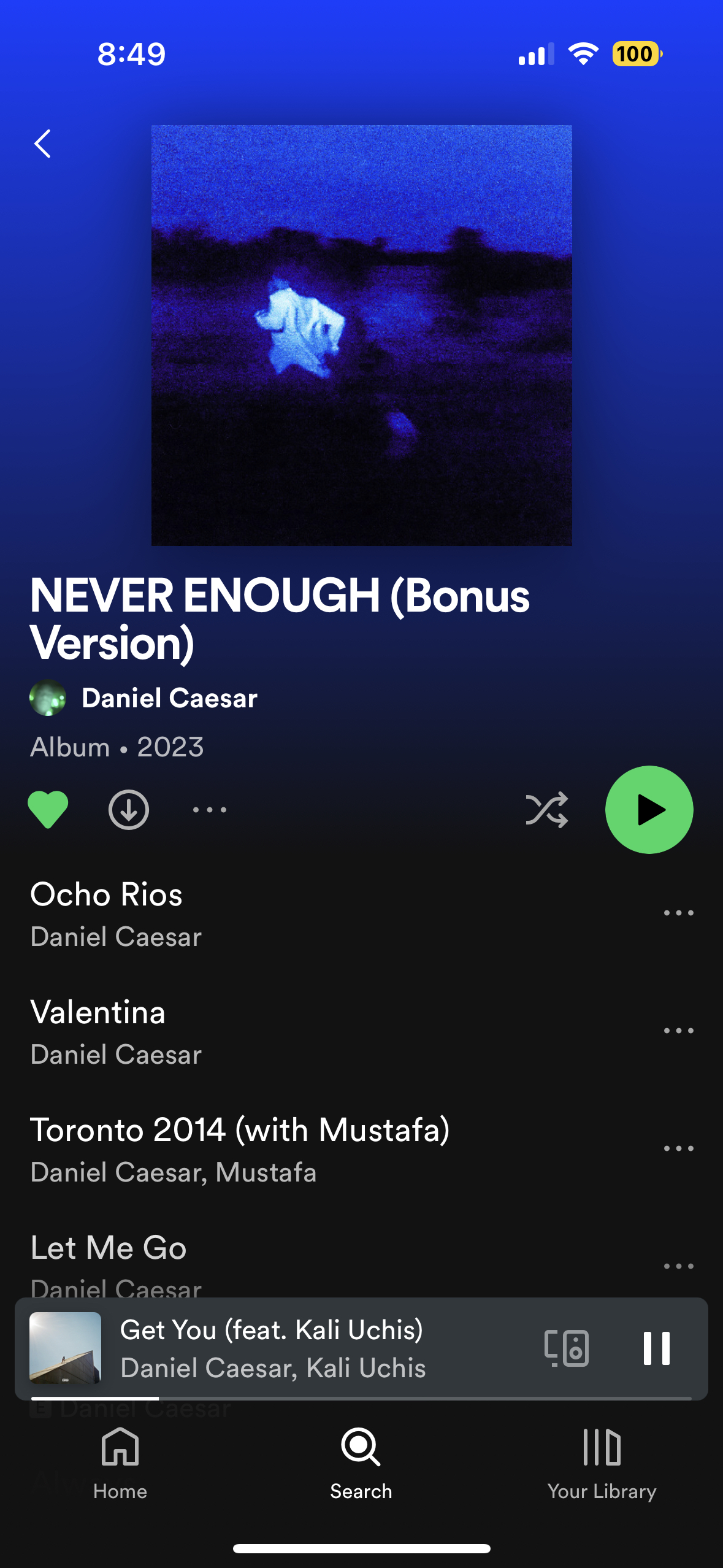
On NEVER ENOUGH
Hindley Wang
Through flaws and glories, Daniel Caesar’s Never Enough explores the spectrum of impossibilities and failings in the predicament that’s modern love. Entangled in the labyrinth of self, the Canadian singer-songwriter pushes his musical poise to existential unease, through salvation and sabotage. In sour insecurity, sweet infatuation and bitter disillusion, Caesar submits the sublime to the banal at the mercy of delusion, offering a lucidly terrestrial edge to a muted erotics that moves beyond angst and melancholy.
“Ocho Rios” inaugurates the album in a bated breath, insinuating a dark, cerebral ringing. Caesar’s sedative falsetto eclipses the mellow horizon. Harmonized vocals rush through the cracks of desolation, murmuring a desperate call: you’re my saving grace, grace, grace—washed ashore from a shallow depth of conscious void. A daft pursuit for an unavailable woman disrupts the fuzzy interlude that bleeds into “Valentina”, halting just short of disillusion. Eerie siren sounds, deviating in braiding beats. The meaning of such a quest concedes to the exotic shadow of unrequited love. Embarked is the quest of rhythms to overcome rhyme in the back of reason. Caesar has devoted much effort to production over writing, weaving a meticulous emotional ambience that suspends the certainty that comes with words in an ambient ambiguity. Adrift to cinematic beginnings, most songs await the variant arrangements of bass and percussion for contextualization—sedimenting a lush multitude that fastens sensations and unbuttons anticipation or logic.
Two thematic streams suffuse this fluid corpus of work: on self and on the other/ lover—diving into the intimate gulf between thoughts and reality. Enter the melancholic ripples from “Toronto 2014”: Mustafa’s airy chorus hangs like stratus clouds, below a sedated sun. Muffled in haze and sobriety, the emotional monologue resounds a distinctive proximity, resonating in a duo from as distant as a memory from 2014. In the wake of fame and backlash, Caesar comes to his own rescue grasping onto his gospel roots, and steps into the still, amorphous puddle of fear. I can hear the bells ringing…we’re still here singing, it’s Father Time… It is the fear and deceit of time. Reassurance takes the looks of recollection. In the slow ascent to confidence, one catches a glimpse of solace in aporia, return in communality: Look up and you’ll see me, and I’ll be around, Cus when I’m home I’m lost…Take it easy on me, you’re still my city. The tide is rising.
In “Let Me Go”, the mess is assessed, sending a chase to closure. Yet, the run from grace and obsession feels endless as the melody marches on without ever reaching any emotional climax. I’m not leading you on, I’m leaving you behind…
Cascades of soulful verses laced with delicate instrumentals, this address seems to surrender beyond the hold of the other to the abyss of self: I’m tryna breathe, why won’t you let me?... My dreams exhaust me... Attachment is unbridled in the search for freedom, eroding the periphery of fatigue and escapism. Soft guitar ballads embrace the feeble pleas in ethereal accord, stretching like an endless field unfolded in an ephemeral dusk.
In the seductive grooves of “Do You Really Like Me”, Caesar unfolds the convoluted psyche behind ego and desire. The lyrics boast ego in the disguise of nonchalance: Do you like the way I talk to you? Do I titillate your mind? Insecurity itches like attraction, wavering red flag camouflaged as a buoy. The juxtaposition of verbal vulgarity and angelic delivery denotes the absurdity in modern love strained in a myriad of lusts and options. At first, I was fucking your friend, but I wanted you. Torment cloaked in mischief. Descending once again from the tranquil grace that he prays for earlier, Caesar hits the bottom of the well: I hate that I’m so jaded/Yeah it’s cool but overrated/I wanna be in love again, spilling the impossibility of romance perpetuated in the abuse of insatisfaction and pain, and the suffocating weight of the self.
While SZA sings her own ruin in a self-aware irrationality of “Kill Bill”,
“Shot My Baby” executes a committed crime, a tit-for-tat. The termination of the other is rationalized by an imaginary betrayal.
Step inside the room I still have dreams about it, what did I see?
The fictionality of this retribution is written in the synthetics of nothing more than a theatrical rehearsal, yielding only delinquent satisfaction. In redemption of a bruised ego, the prize becomes the cost: the pride for proving himself to be the man that he is, despite/clearly she don’t think I can. A shrieking delirium of chanting, glitching, and two guitar catharsis close the song, held together like a loose bandage, masking the deeper wound of disconnection that predates infidelity.
“Always” stands out in a graceful simplicity that strips the complexity of heartbreak to a leap of faith, plunging into the depth of longing. I’ll be here… just know that I am not a phase, I am always. Caesar sheds his edges and offers a modern classic that turns an end into everything.
And that everything then turns into a meander: between impatience and unfulfillment in “Buyers Remorse”, misery and ennui in “Vince Van Gogh”, manipulation and hedonism in “Unstoppable”.
What sets Caesar apart from his contemporaries is his crude and aesthetic self-disclosure of flaws and incompleteness to a point of brutalism, both textually and emotionally—leveled with a procedural dynamism in production that propels stunning experimentation, resisting the formulas of what simply works. Despite some thematic redundancy and lyric banality, Caesar still proves himself to be the prodigy, only working on his gravity now. And that takes reiteration and murmurs.
Never Enough begins as a raw search without a clear aim but ends up looking like an impossible tranquility that vibrates in angst, composure, reassurance and insatisfaction. It is no odyssey, but it sings for the fragile ego and the frail heart. In excess and famine, it lets me soak in my feelings, and begs for repeat.
aug. 2023
i know you want a rating but i am bad with numbers.
i know you want a rating but i am bad with numbers.
just tell me your favorite tracks:)
